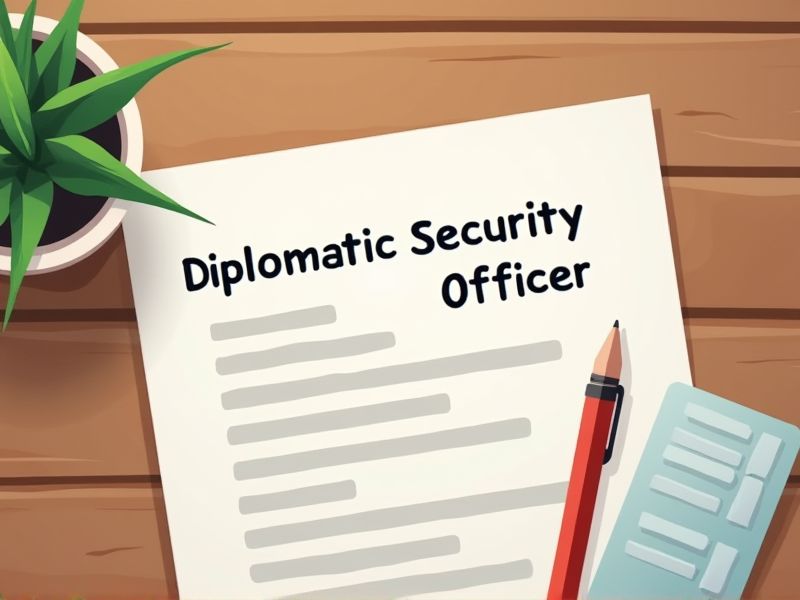
Diplomatic Security Officers play a critical role in ensuring the safety of diplomats and safeguarding sensitive information. The complex nature of international relations requires officers to be well-versed in security protocols, emergency response, and risk management. Certain certifications validate their proficiency and commitment to maintaining high standards of security. Key certifications may be essential for a Diplomatic Security Officer.
Basic Security Officer Training Certification
The Basic Security Officer Training Certification equips a Diplomatic Security Officer with foundational knowledge crucial for safeguarding diplomatic missions. The training addresses essential security protocols and risk assessment techniques needed to handle international threats effectively. Certification ensures compliance with international security standards, enhancing the credibility and reliability of the security personnel. In global diplomatic contexts, this certification standardizes competence, minimizing risk and fostering trust within the diplomatic community.
Advanced Security Officer Training Certification
The heightened complexity of global security threats necessitates Advanced Security Officer Training Certification to equip Diplomatic Security Officers with specialized skills. Diplomatic environments often involve high-risk situations, and advanced certification ensures officers are prepared to manage crises effectively. This certification fosters a deeper understanding of international security protocols, which is crucial for protecting dignitaries and sensitive information. It instills confidence among international partners and enhances the credibility of diplomatic missions.
Defensive Tactics and Use of Force Certification
Diplomatic Security Officers often operate in high-risk environments where the potential for hostility is elevated, necessitating proficiency in defensive tactics and use of force to ensure their own safety and that of those they protect. Without certification in these areas, officers may lack the critical skills required to de-escalate tense situations, potentially resulting in increased danger or diplomatic fallout. Certification establishes a standardized level of competency, ensuring that all officers possess a common understanding of when and how to apply force judiciously. These certifications reflect adherence to international laws and norms, reinforcing the credibility and professionalism of diplomatic security operations globally.
Firearms Proficiency Certification
Diplomatic Security Officers often operate in high-risk environments, where the ability to accurately respond to a threat can prevent potential harm. Firearms Proficiency Certification ensures that these officers have the necessary skills and confidence to handle weapons effectively in crisis situations. This certification acts as a benchmark for competency, reducing the likelihood of accidents or misfires. Diplomatic missions frequently occur in volatile regions, making it critical for officers to be well-prepared to protect themselves and the individuals they are assigned to safeguard.
Emergency Medical Technician (EMT) Certification
Having an EMT certification equips diplomatic security officers with essential medical skills that can address emergencies immediately, thus enhancing their capability to protect lives. Diplomatic missions often occur in politically unstable regions where quick medical response can be crucial. EMT training also provides officers with the ability to assess and manage medical incidents, fostering resilience in high-pressure situations. Being EMT-certified can increase the officer's value to diplomatic teams, as they add a layer of readiness and precaution against unforeseen medical crises.
First Aid and CPR Certification
Diplomatic Security Officers are often the first line of response in critical situations, necessitating the need for First Aid and CPR certification to ensure immediate care can be provided. In high-stress environments, their ability to administer first aid can significantly impact the survival and recovery outcomes of individuals. Such certification equips them with the skills to identify emergencies and maintain safety until professional medical assistance arrives. Enhanced preparedness and response capabilities can help maintain diplomatic missions' operational integrity during unforeseen health emergencies.
Executive Protection Certification
Diplomatic Security Officers often face high-risk environments, and an Executive Protection Certification equips them with specialized skills to manage threats effectively. The certification enhances their ability to assess situations and implement security measures tailored to protecting dignitaries. This qualification also ensures they stay updated with international security protocols, maintaining high standards in protection services. Certifications also signify a comprehensive understanding of both physical and tactical strategies essential for safeguarding individuals in volatile political settings.
Counterterrorism Strategies Certification
Diplomatic Security Officers often work in regions with high terrorism threats, necessitating specialized knowledge to effectively identify and mitigate potential dangers. Counterterrorism Strategies Certification equips them with the skills to recognize and neutralize emerging threats before they escalate. This certification enhances their ability to implement preventive measures, ensuring the safety of embassies and consular staff. Continuous training in counterterrorism strategies keeps officers updated on evolving tactics used by extremists, which is critical for maintaining security and stability in volatile areas.
Cybersecurity Fundamentals Certification
The Cybersecurity Fundamentals Certification provides Diplomatic Security Officers with crucial knowledge to protect sensitive information from cyber threats. Understanding cybersecurity principles mitigates the risk of data breaches that could compromise diplomatic operations. Improved cybersecurity skills enable officers to better identify and respond to cyber incidents that may jeopardize national security. Certification ensures that officers are equipped to handle the increasing complexity of cyberattacks targeting government infrastructure.
Crisis Management and Emergency Preparedness Certification
Diplomatic Security Officers face high-risk situations where the need for crisis management skills is paramount to ensure the safety of personnel and facilities. Acquiring an Emergency Preparedness Certification equips officers with the necessary strategies to respond effectively to incidents such as attacks or natural disasters. Certification enhances credibility and demonstrates a commitment to maintaining a high standard of security operations. Proper training in crisis scenarios can lead to more efficient coordination with local law enforcement and international security agencies.
Summary
As a Diplomatic Security Officer, obtaining additional certifications enhances your professional qualifications. This often leads to increased job performance and a greater scope of responsibilities. These certifications also boost credibility and trust among diplomatic missions and global counterparts. You're likely to experience improved career prospects and potential for higher compensation.
